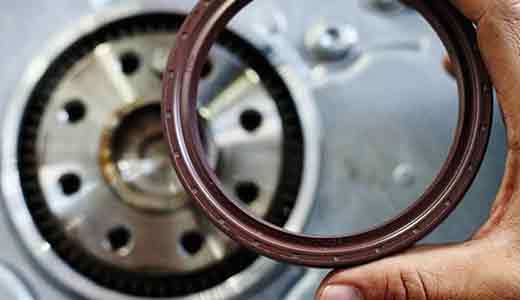Popular Information
Add: Yongkang st.renxian,xingtai city,hebei province china.054000
Tel:+86-319-7566977 7519805
Phone : +8613903298188
Fax:+86-319-7566976
E-mail :richard@bxseals.com
The Crucial Role of Oil Seals in Boosting Agricultural Machinery Efficiency
Release Time:
Nov 07,2025
The Crucial Role of Oil Seals in Boosting Agricultural Machinery Efficiency Table of Contents Introduction to Oil Seals in Agricultural Machinery Understanding Oil Seals: Definition and Purpose Types of Oil Seals Used in Agricultural Equipment The Significance of Oil Seals in Agricultural Machinery Benefits of Using High-Quality Oil Seals Proper Maintenance of Oil Seal
The Crucial Role of Oil Seals in Boosting Agricultural Machinery Efficiency
Table of Contents
- Introduction to Oil Seals in Agricultural Machinery
- Understanding Oil Seals: Definition and Purpose
- Types of Oil Seals Used in Agricultural Equipment
- The Significance of Oil Seals in Agricultural Machinery
- Benefits of Using High-Quality Oil Seals
- Proper Maintenance of Oil Seals for Optimal Performance
- Common Issues with Oil Seals and Their Solutions
- Conclusion: Enhancing Agricultural Machinery Efficiency with Oil Seals
- Frequently Asked Questions
Introduction to Oil Seals in Agricultural Machinery
In the realm of agricultural machinery, every component plays a vital role in ensuring optimal performance and efficiency. Among these components, **oil seals** stand out for their significant contribution to the durability and functionality of equipment. These seemingly simple devices protect engine systems and other critical machinery components from contamination and oil leakage, which can lead to catastrophic failures if not managed properly. This article delves into the importance of oil seals in enhancing agricultural machinery performance, focusing on their definitions, types, benefits, and maintenance practices.
Understanding Oil Seals: Definition and Purpose
Oil seals, often referred to as **shaft seals**, are designed to retain lubricants and prevent dirt, dust, and moisture from entering machinery components. They consist of a flexible lip that forms a tight seal against a rotating shaft, thus ensuring that the lubricant remains inside the system while keeping contaminants out. The primary purpose of oil seals is to enhance the reliability and longevity of machinery by minimizing wear and tear on critical components.
The Mechanics Behind Oil Seals
The functionality of oil seals hinges on their ability to create a reliable barrier. As machinery operates, the rotating shaft generates motion that compresses the seal against the bearing or housing. This compression creates a **hydraulic seal**, effectively blocking oil leakage and preventing the ingress of harmful contaminants. Understanding this mechanical process is crucial for recognizing the importance of using high-quality oil seals in agricultural machinery.
Types of Oil Seals Used in Agricultural Equipment
Various types of oil seals are designed to meet different operational requirements in agricultural equipment. The selection of the appropriate oil seal is essential for ensuring proper functionality and performance.
1. Rubber Oil Seals
Rubber oil seals are the most common type found in agricultural machinery. They offer excellent elasticity and resistance to wear, making them suitable for a variety of applications.
2. Metal-Cased Oil Seals
These seals provide added strength and durability, making them ideal for heavy-duty agricultural machinery. Their metal casing can withstand higher pressures and harsher operating conditions.
3. PTFE Oil Seals
Polytetrafluoroethylene (PTFE) seals are known for their chemical resistance and low friction properties. They are often used in applications where high temperatures or aggressive chemicals are present.
4. Spring-Loaded Oil Seals
Spring-loaded seals feature a spring that helps maintain contact between the seal and the shaft, ensuring a tight fit even under varying operating conditions. These are particularly useful in applications with fluctuating temperatures or vibrations.
The Significance of Oil Seals in Agricultural Machinery
Oil seals play a pivotal role in the overall performance and longevity of agricultural machinery. Several key factors highlight their significance:
1. Preventing Oil Leakage
Oil leakage can lead to significant operational inefficiencies and costly repairs. Oil seals effectively prevent leakage, ensuring that machinery operates smoothly and efficiently.
2. Protecting Against Contamination
Agricultural environments are often filled with dirt, dust, and moisture. Oil seals act as a barrier against these contaminants, safeguarding critical components and prolonging the lifespan of machinery.
3. Reducing Maintenance Costs
By preventing leaks and contamination, oil seals significantly reduce the frequency of maintenance and repairs. This leads to lower operational costs and improved productivity for farmers and agricultural businesses.
4. Enhancing Energy Efficiency
When oil seals function properly, they contribute to the overall energy efficiency of agricultural machinery. Minimizing friction and leakage allows engines to run more efficiently, saving fuel and reducing emissions.
Benefits of Using High-Quality Oil Seals
Investing in high-quality oil seals yields numerous benefits for agricultural machinery operators. Some of the most notable advantages include:
1. Improved Equipment Reliability
High-quality oil seals enhance the reliability of machinery, reducing the likelihood of unexpected breakdowns and downtime.
2. Increased Operational Lifespan
By protecting critical components from wear and tear, quality oil seals contribute to the extended operational lifespan of agricultural machinery.
3. Enhanced Safety
Proper sealing reduces the risk of leaks that could lead to hazardous situations, ensuring a safer working environment for operators.
4. Better Performance Under Extreme Conditions
High-quality oil seals are designed to withstand extreme temperatures and pressures, ensuring optimal performance even in challenging agricultural environments.
Proper Maintenance of Oil Seals for Optimal Performance
Maintaining oil seals is crucial for ensuring their longevity and effectiveness. Here are some essential maintenance practices:
1. Regular Inspections
Conduct routine inspections of oil seals to identify any signs of wear, damage, or leaks. Early detection can prevent more significant problems down the road.
2. Clean Surrounding Areas
Keep areas around oil seals clean and free from debris. Contaminants can compromise the seal's integrity, leading to potential failures.
3. Replace Worn Seals Promptly
If you notice any signs of wear or damage, replace oil seals promptly to avoid further issues. Timely replacement is a small investment compared to the costs associated with machinery breakdowns.
4. Use the Right Sealant
When installing new oil seals, use the appropriate sealant to ensure a secure fit. Proper installation techniques will enhance the seal's performance and longevity.
Common Issues with Oil Seals and Their Solutions
Understanding common issues associated with oil seals can help operators address problems swiftly and effectively.
1. Leakage Problems
Leakage can occur due to worn seals or improper installation. Regular inspections and timely replacements are key to preventing this issue.
2. Contamination Ingress
Contamination can compromise the seal's integrity. Ensure that seals are properly installed and consider using additional protective measures if operating in harsh environments.
3. Degradation from Heat or Chemicals
Some seals may degrade due to exposure to extreme heat or aggressive chemicals. Choosing seals made from suitable materials can mitigate this issue.
4. Excessive Wear
Excessive wear may indicate alignment issues or improper installation. Regular maintenance and adjustments can help prevent this problem.
Conclusion: Enhancing Agricultural Machinery Efficiency with Oil Seals
In summary, oil seals are integral components in agricultural machinery, playing a vital role in enhancing performance and longevity. By preventing oil leakage, protecting against contamination, and reducing maintenance costs, these seals contribute significantly to the efficiency of agricultural operations. Understanding the types of oil seals, their benefits, and proper maintenance practices can empower operators to make informed decisions, ultimately leading to improved productivity and reduced operational costs. Investing in high-quality oil seals is not just a choice; it is a necessity for ensuring that agricultural machinery remains reliable and efficient.
Frequently Asked Questions
1. What are the signs that an oil seal needs replacement?
Signs include visible oil leaks, unusual noises from the machinery, and decreased performance. Regular inspections can help identify these issues early.
2. How often should oil seals be inspected?
It is advisable to inspect oil seals during routine maintenance checks, typically every few months or as per the manufacturer's recommendations.
3. Can I use any type of oil seal for my agricultural machinery?
No, it is essential to select the appropriate type of oil seal based on the specific machinery and operating conditions to ensure optimal performance.
4. What materials are commonly used in oil seals?
Common materials include rubber, PTFE, and composite materials, each chosen based on the application's specific requirements.
5. How can I extend the lifespan of my oil seals?
Regular inspections, maintaining cleanliness around seals, and timely replacements are crucial for extending the lifespan of oil seals in agricultural machinery.
Key words:



